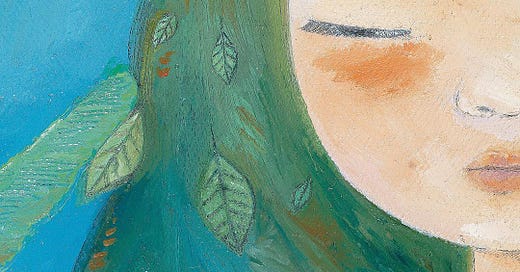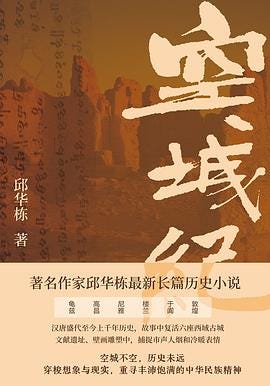CWN#3: Round-up of round-ups // Suspense stories from China’s best young writers award
Featuring Zheng Xiaolü 郑小驴 and Sun Pin 孙频
Welcome to the Cold Window Newsletter’s first issue of 2025! In this issue: a stroll through Chinese critics’ picks for the best books of last year; and two heart-pounding novellas pulled from the nominations list for one of China’s most prestigious literature awards.
EOY: A round-up of round-ups of the best Chinese books of 2024
Month to month, it can be hard to get a sense for which books are hot in China. The new novels getting critical acclaim in literary journals might have absolutely nothing to do with what’s actually available on bookstore displays, and nonfiction books might be explosively popular among a small demographic without really registering in the mainstream. By year-end season, though, consensus starts to form about which of the last year’s books are the most worth paying attention to. For compulsive followers of literary criticism WeChat accounts like myself, this season is heaven.
Just to give a taste of what books and book-length pieces are getting talked about right now, in the brief flurry of retrospection before readers and critics settle into the new crop of 2025 publications, I’ve put together a little summary of which books have been appearing again and again on the year-end lists.1 Bear in mind that this little round-up of round-ups is very unscientific. The nine lists I surveyed tend to favor highbrow, longform novels and nonfiction, and they’re definitely a better approximation of what critics are saying than of what everyday readers are gravitating toward. Someone do a critical round-up of 2024’s web fiction!
Still, hopefully this summary gives you a taste of what’s out there. Everything mentioned below is a full-length book, none of which I’ve gotten around to reading yet. (There’s also quite a lot out there about the best short stories and novellas of 2024... but I’ll save that for another issue.) And if you want more like this, check out Na Zhong’s more detailed introductions to a few of the Douban Best Books of 2024 over at the China Books Review!
Two nonfiction books appeared on the majority of the nine best-of-year lists I surveyed:
刘子超《血与蜜之地:穿越巴尔干的旅程》(Blood and Honey: A Journey through the Balkans by Liu Zichao), a travel narrative from Trieste to Athens examining legacies of violence through the author’s encounters with ordinary people (5 lists)
李颖迪《逃走的人》(Runaways by Li Yingdi), a portrait of a town in Northeast China and the young people who have fled there to escape rising living costs and rising stress in urban China (5 lists)
Five other nonfiction books turned up again and again:
陈冲《猫鱼》 (Catfish by Chen Chong), the actress and director’s excavation of her family history in Shanghai and her own experiences studying abroad and returning to China to make films (4 lists)
宋明蔚《比山更高:自由攀登者的悲情与荣耀》(Higher Than the Mountains: The Grief and Glory of Free Climbing by Song Mingwei), a journalistic exploration of China’s extreme mountain climbing community (4 lists)
杨素秋《世上为什么有图书馆》(Why Does the World Need Libraries? by Yang Suqiu), a plea for libraries in the modern world via the author’s struggle to establish a library branch in an underserved district of Xi’an (3 lists)
孙立天《康熙的红票:全球化中的清朝》(The Kangxi Emperor’s Red Missive: The Qing Dynasty and Globalization by Sun Litian), a painstaking history of the relationship between the imperial court and European missionaries in the eighteenth century (3 lists)
孙萍《过渡劳动:平台经济下的外卖骑手》(Transitional Labor: Food Delivery Workers in the Platform Economy of China by Sun Ping), an anthropological examination of what platform work at the intersection of the formal and informal economies says about modern China (3 lists)
Fiction has a hard time rising to the top of these lists, probably because each critic has their own picks for the best novels of the year. Still, three novels and (gasp!) one story collection stood out:
邱华栋《空城纪》(Chronicle of the Empty City by Qiu Huadong), a lengthy magnum opus spanning a thousand years of history in western China (three lists)
张楚《云落》(Cloudfall by Zhang Chu), another long novel revolving around ordinary lives in a small seaside town (three lists)
魏思孝《土广寸木》(A Bit of Wood on Open Land by Wei Sixiao), an ensemble novel carefully documenting everyday village life in a modernizing China (three lists)
龚万莹《岛屿的厝》(Islands Against the Current by Gong Wanying), a debut story collection set in the author’s home province of Fujian (three lists)
Feature: Novellas at the intersection of highbrow and hard-boiled
I may as well admit that my favorite source for new Chinese fiction recommendations is the nomination list for the Blancpain-Imaginist Literary Award 宝珀理想国文学奖. The award is limited to writers under 40, so it tends to be a pretty reliable who’s-who of authors who have been gathering critical attention for a few years but are still too early in their careers to be household names. Best of all, the award has a pretty good track record of recognizing short fiction collections (although this year’s surprise winner, A Bit of Wood on Open Land《土广寸木》by Wei Sixiao 魏思孝, is a full-length novel). Pick a collection from the list of past winners and nominees, pull up its title story, and you can be pretty confident that you have a worthwhile read in your hands.2
Unintentionally, but unsurprisingly, all four writers I’ve profiled in this newsletter so far are Blancpain-Imaginist nominees. In this issue, I’ll add two more, one from last year’s shortlist and one from 2021. Prestigious nominations aren’t the only thing these writers have in common: they’re also both from the same generation (80后—born after 1980), and they’re both literary writers who know how to write a heart-pounding suspense story.
We’ll start with Zheng Xiaolü 郑小驴, born 1986, whose collection Southern Bach《南方巴赫》won him wide acclaim in 2024. I only started reading Zheng recently, but he’s by no means a newcomer on the literary scene—as early as 2011, when he was only 25, the eminent Can Xue 残雪 named him as her pick for a Words Without Borders series focusing on emerging authors. The translation that resulted from that nod somehow remains the only time his fiction has appeared in English, but hopefully the new attention that Southern Bach received will help change that.
Zheng is a painterly writer, but his pacing and characters are borrowed directly from hard-boiled crime. This isn’t an especially unusual combination in Chinese fiction—Dongbei Renaissance writing, for instance, often wades into the territory of crime fiction—but I’m not aware of many contemporary writers who can pivot as quickly from an achingly beautiful nature scene to a vicious brawl as Zheng can. Take this introspective scene from “Saltwater Town” 《盐湖城》, which directly precedes the story’s bloody climax:
那是他第一次见到盐湖。一个银光粼粼的盐的世界,盐山盐雕盐海,猎猎的寒风也含着盐的味道。天空从玫瑰红变成紫罗兰色……人走在盐湖中,就像走在一面巨大的镜面上。澄清透明,仿佛能召见自己的前世今生。
“He had never seen a salt lake before. A silvery, crystalline world of salt lay before him, full of salt hills, salt statues, salt pools. The cold wind rippling around him tasted of salt. The sky deepened from rose to violet . . . Walking into the middle of the lake was like walking atop an enormous mirror, so clear and transparent that you could almost see your past and present lives reflected back at you.”
If you’re looking for an introduction to his work, and have time for a longer novella, I recommend “Southern Bach” 《南方巴赫》, the title story of last year’s collection. The novella starts slow, with a bored teen stuck in his uncle’s small town studying to get his driver’s license. But as he starts to snoop around his uncle’s private life, and as he starts to develop a strange attachment to a mysterious girl he met over social media, a mounting sense of dread starts to creep over the novella. Early on, the girl tells him half of a story about a pair of sheep who fall into a deep pit in a secluded forest. The payoff to this dangling thread, near the very end of the novella, is probably the most pulse-pounding scene I’ve ever encountered in contemporary Chinese fiction. Hopefully we’ll see it in English one day.
Zheng Xiaolü 郑小驴
Born 1986
Paper Republic
Recommended story in Chinese: 《南方巴赫》(excerpt)
Available in English: “The Festival of Ghosts” 《鬼节》(full story; interview)
Zheng Peng, pen name Zheng Xiaolü, was born in 1986 in Longhui, Hunan Province. A member of the first graduating class of the creative writing program at Renmin University, he is a literature professor at Hunan Normal University. He has received the Maodun Newcomer Award, the Zijin-Renmin Literary Star Novel Award, and the Chinese Youth Author Novella Award, among others. His writings have been translated into English, Japanese, Czech, and Spanish. His works include the novels 《西洲曲》(Song of Xizhou) and 《去洞庭》 (Journey to Dongting), and the story collections 《南方巴赫》(Southern Bach), 《骑鹅的凛冬》(Swanrider Winter), 《消失的女儿》(The Vanished Daughter), 《1921年的童谣》(Children’s Songs of 1921), 《蚁王》(Ant King), and 《天花乱坠》(A Rain of Flowers),as well as the essay collection 《你知道的太多了》(You Know Too Much).
Sun Pin 孙频, born 1983, is one of the most prominent “post-80s” authors in all of China. It’s truly a crime that almost none of her fiction has been translated into English yet—maybe because novellas, her preferred form, can have a hard time finding a home in the English-language publishing market. If you’ve read Sun Pin before, you’ll know that her novellas are often suffused with a sense of whimsy and everyday magic that can easily tip over into the unnerving when she wants it to. There’s an image in her 2023 novella “Magician by the Sea”《海边魔术师》 that captures this well: a tiny human figure at the top of a towering construction crane, emerging from his tiny control room to stroll back and forth along the crane arm. There’s something both adorable and terrifying about his exercises far above the narrator’s head, as though he’s about to take flight. That suspense is ever-present in Sun’s fiction: when will the whimsy finally teeter into disaster?
My favorite piece by her happens to be the title story of a collection shortlisted for the Blancpain-Imaginist prize in 2021: “In the Name of Beasts” 《以鸟兽之名》, a murder mystery that veers much closer to Zheng Xiaolü-style crime fiction than is typical for Sun. The author herself is from a remote town in northern China’s Shanxi Province, but here she adopts the narrative voice of an outsider looking in at her home region. Her narrator is a crime writer looking for material for his next novel in an eerie suburban community, recently constructed to house villagers removed by the government from their isolated mountain homes. Shunned by the villagers, the writer grows closer and closer to You Xiaolong, an eccentric, animated young resident whose increasingly erratic behavior both fascinates and repels him. The distrustful villages, the indecipherable You Xiaolong, the prejudiced narrator, and the specter of a murder combine to create an exquisite tension that doesn’t let up until the last page.
Sun Pin 孙频
Born 1983
Paper Republic
Recommended story in Chinese: 《以鸟兽之名》(excerpt)
Available in English: “The Balcony” 《在阳台上》(full story); “Shadow“ 《相生》(Chinese Arts and Letters, Oct. 2016)
Sun Pin, originally from Jiaocheng in Shanxi Province, is a member of the Jiangsu Provincial Writers’ Association. Her major works include the story collections 《疼》(Pain), 《盐》(Salt),《同体》(As One), 《三人成宴》(Feast for Three), 《松林夜宴图》(Night Banquet Among the Pines), 《以鸟兽之名》(In the Name of Beasts), 《鲛在水中央》(Skeleton in the Lake), and 《海边魔术师》(Magician by the Sea).
That’s all this time. Next issue: a return to Dongbei. Thanks for reading!
This round-up is based on the best-of-year lists published by the following journals, organizations, websites, and WeChat accounts: 新京报书评周刊、凤凰网读书、文艺批评、豆瓣、何人斯的书影世界、扬子江文学评论(长篇小说排行榜)、收获(长篇小说榜与唱片非虚构榜)、中国小说学会、界面新闻. I know, I know, this is an eclectic assemblage of sources that gives short shrift to certain corners of the Chinese literary market, especially popular fiction and poetry. Some of these lists were ranked, and if I’d taken that into account, various other books might have shot to the top of my round-up. But it’s a start, right?
Warning: the award is co-sponsored by a watch brand, and searching it online turns up a lot of luxury watch content.









